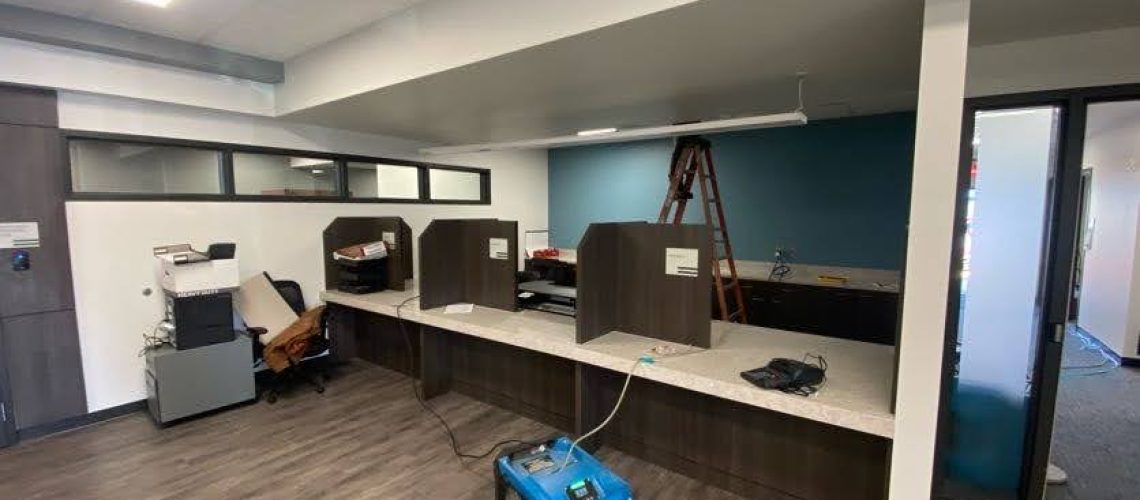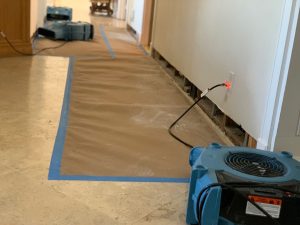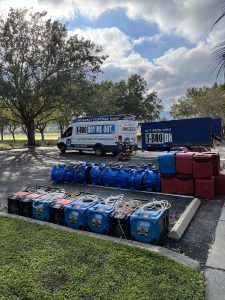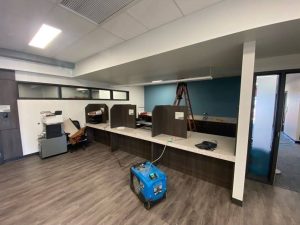When you think about water damage, your mind probably goes straight to storms, floods, or burst pipes. But did you know that some of the most common water damage emergencies we respond to at Dry Me Out are caused by everyday household appliances? That’s right, your dishwasher, washing machine, refrigerator, and water heater might be quietly putting your home at risk.
Whether it’s a slow leak that went unnoticed for weeks or a sudden burst that floods your kitchen or laundry room, appliance-related water damage is no joke, but don’t panic. We’re here to walk you through exactly what to do if it happens, how to minimize the damage, and what to look out for to prevent it from happening in the first place.
Key Takeaways
- Appliance leaks (from washers, dishwashers, fridges, etc.) are a common source of household water damage.
- Shut off water and electricity immediately if it’s safe to do so, then remove excess water and call a professional.
- Mold can start growing within 24–48 hours of water exposure.
- Common causes include worn-out hoses, faulty seals, and disconnected water lines.
- Professional water damage restoration services are crucial to prevent long-term issues.
- Use braided hoses, leak detectors, and routine inspections to prevent future problems.
- Homeowner’s insurance may cover sudden appliance leaks, but often excludes slow, long-term damage.
- Dry Me Out offers fast response, water extraction, drying, and full restoration services for appliance-related water damage.
Common Appliances That Cause Water Damage
Before we dive into the steps to take when water damage strikes, let’s look at some of the top culprits we see time and time again.
Washing Machines
Hoses can crack, loosen, or burst, especially if they’re old or made of rubber instead of braided stainless steel. Overflowing due to clogs or malfunctioning sensors is also common.
Dishwashers
Leaks around the door seal, backed-up drain lines, or overfilled units can all lead to water seeping under the kitchen floor.
Refrigerators
Ice makers and water dispensers are convenient, but the small plastic tubing that connects them to the water line can become brittle or disconnected, causing slow leaks behind the fridge.
Water Heaters
Over time, water heaters rust, crack, or build up pressure, leading to leaks or full-on tank failures that can release gallons of water in a short period.
Air Conditioners
HVAC units that aren’t draining properly or have clogged condensate lines can cause water to overflow and leak into walls or ceilings.
What To Do Immediately After Appliance Water Damage
Acting fast can be the difference between a quick fix and a major home restoration. If you’ve discovered water from an appliance, here’s what you should do right away:
1. Shut Off the Water Supply
If the appliance has a dedicated shut-off valve (like a washer or fridge line), turn it off. If not, shut off the main water valve to the home. The goal is to stop any more water from flowing.
2. Turn Off Electricity if Necessary
If water is near any electrical outlets, appliances, or your fuse box, don’t touch anything, call an electrician or your local power company. If it’s safe to do so, turn off the power to that part of the home.
3. Unplug the Appliance
Safely unplug the appliance if you can reach the plug without stepping in water or risking shock.
4. Remove Excess Water
Use towels, a mop, or a wet/dry vacuum to get up as much standing water as you can. The sooner you remove it, the less chance it has to seep into floors or walls.
5. Call a Professional Water Damage Company
This is where Dry Me Out comes in. Even if you think the damage is minimal, water has a sneaky way of hiding in subfloors, behind cabinets, and inside drywall. Our team uses moisture meters, infrared cameras, and professional drying equipment to make sure every last drop is handled.
Why You Shouldn’t Wait to Get Help
You might be tempted to just dry it yourself and call it a day—but that’s a risky move. Here’s why:
- Mold Growth: Mold can begin growing in as little as 24–48 hours after water exposure. It loves to hide behind walls and under flooring where you can’t see it.
- Structural Damage: Even a slow leak can cause wood framing, floors, and subfloors to rot over time, compromising the integrity of your home.
- Odors: Lingering moisture leads to musty smells that are hard to get rid of without proper drying.
- Insurance Claims: Insurance companies often require professional documentation to approve a claim. If you wait, your coverage could be impacted.
At Dry Me Out, we’re experienced in working with insurance companies and can even help walk you through the claims process.
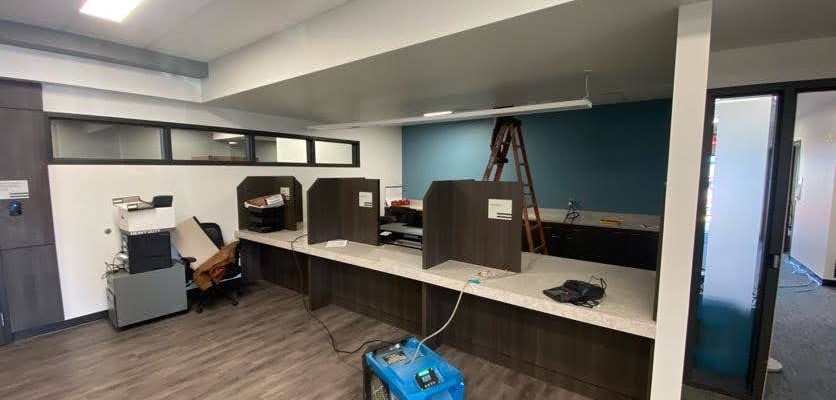
How We Handle Appliance Water Damage
When you call us, here’s what you can expect:
Initial Assessment
We’ll show up fast, assess the extent of the damage, and find the source of the water.
Moisture Detection
Using advanced tools, we’ll determine how far the water has spread, even if it’s behind walls or under floors.
Water Extraction
We use professional-grade equipment to remove all standing water quickly and safely.
Drying and Dehumidifying
Next, we place air movers and dehumidifiers to dry the area completely. This step is key to preventing mold and structural damage.
Cleaning and Sanitizing
Depending on the situation, we may clean and disinfect the area, especially if water sat for a while or touched porous materials.
Restoration
We will provide you with any additional services (like mold removal and remediation) and perform the finishing touches to make sure your space is completely restored.
Tips to Prevent Appliance Water Damage
Prevention is always better than dealing with the aftermath. Here are a few tips to help you stay ahead of leaks and appliance failures:
Inspect Hoses and Connectors Regularly
Check washing machine hoses, fridge lines, and dishwasher connections for signs of wear or cracking. Replace them every 5 years, or sooner if they look worn.
Upgrade to Braided Stainless Steel Hoses
These are more durable and less likely to burst than traditional rubber hoses.
Don’t Overload Your Washing Machine or Dishwasher
Too much soap or too many clothes can strain the machine and lead to overflows or clogs.
Look Behind and Under Appliances
Every few months, move appliances like your fridge or washer and check for moisture or discoloration.
Use a Water Leak Detector
Smart sensors placed near appliances can alert you to leaks before they become major problems.
Schedule Regular Maintenance
Have your water heater flushed and inspected yearly. This helps extend its life and prevent surprise breakdowns.
What About Insurance?
In many cases, water damage caused by a sudden appliance failure may be covered by your homeowner’s insurance, but there’s a catch: gradual damage from long-term leaks usually isn’t covered.
That’s why it’s so important to act quickly and document everything. Take photos of the damage, save receipts for any expenses, and call us at Dry Me Out for a professional inspection and report. We’ll help make sure you’re in the best position to submit a successful claim.
When to Call Dry Me Out
Here’s a good rule of thumb: if there’s more than a few towels’ worth of water, or if the leak has been going on for more than a few hours, it’s time to call in the pros.
Water can spread fast and cause damage even where you can’t see it. Our team is trained, certified, and equipped to handle appliance water damage of any size. We’re fast, thorough, and here for you 24/7.
Final Thoughts
Dealing with water damage from an appliance can feel overwhelming, especially when it catches you off guard. But with quick action, the right help, and a little knowledge, you can minimize the damage and get things back to normal.
At Dry Me Out, we’ve helped countless homeowners recover from water disasters big and small, and we’re always just a phone call away. Whether your washing machine flooded the laundry room or your fridge sprung a hidden leak, we’ve got your back. Call us right away to get immediate help and relief.

